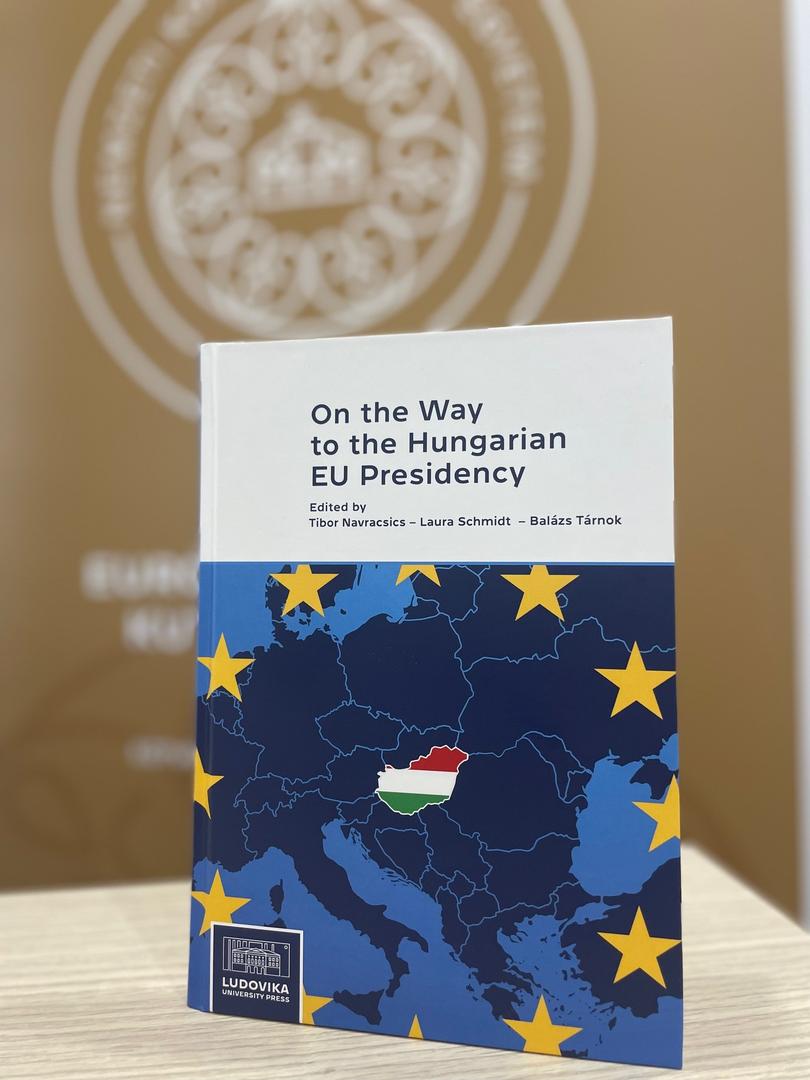On November 15, in Brussels at the Permanent Representation of Hungary to the European Union, the Europe Strategy Research Institute and the MFOI Advisory jointly presented the English-language book titled "On the Way to the Hungarian EU Presidency". Following the book presentation, a roundtable discussion was held to debate current and future issues of cohesion policy with professional and academic participants. This event was part of the Ludovika University of Public Service EU Presidency Strategy, encompassing the next stage of the research institute's monthly Hungarian EU presidency workshop series, presenting a policy paper on cohesion policy and subsequent discussions.

The event was opened by Enikő Győri, Member of the European Parliament, who shared her experiences concerning cohesion during the EU Presidency in 2011. She emphasized that the objectives of cohesion policy extend beyond solely assisting poorer regions or specific member states; it also involves mitigating differences among member states. She highlighted the importance of modernizing cohesion policy and changing the European perception through a positive campaign. Cohesion policy isn’t about wasting money but rather aiding digital and green transitions, which are in the interest of the entire European Union.

Modernisation in cohesion
Following the event's opening, Bernadett Petri, Executive Director of MFOI Advisory, presented a policy proposal outlining modernization steps for cohesion policy. She proposed integrating the values of cohesion policy into the criteria system of direct EU funds, aiming to assist less developed member states in utilizing these funds effectively. This approach would encourage collaboration between more developed and lagging regions and member states.
Opportunity for channeling Hungarian interests

After the first two presentations, the roundtable discussion featured historical retrospectives that justified the establishment of cohesion policy (southern enlargement) and later its maintenance (eastern enlargement). Balázs Kós, Executive Director of Bluedoor Consulting, emphasized the necessity for targeted solutions in the modernization of cohesion policy, acknowledging that certain solutions may not be suitable for all member states. Bernadett Petri highlighted the complexity of cohesion policy, which simultaneously aids convergence in multiple areas: territorial and personal cohesion, reduction of social and innovation gaps. Tamás Kiss-Gálfalvi, a researcher and project development manager at the Centre for European Policy Studies, noted the commencement of the mid-term review of the Multiannual Financial Framework (MFF), providing an opportunity to channel Hungarian interests. He stressed the importance of enhancing Hungarian administrative capacities to create innovative projects contributing to economic growth. Bernadett Petri agreed, suggesting that an approach focused on data could assist in the modernization of cohesion policy, allowing for the identification of development directions. Tools aiding statistical improvement should be retained, while those not contributing to successful and rapid convergence need restructuring. Finding like-minded member states and collaborating to represent and channel common interests was considered crucial. Additionally,Tamás Kiss-Gálfalvi highlighted the significance of cohesion policy in rural development, emphasizing the development of agricultural, innovation, and urban regions.
Volumes on the Presidency

After the discussion, Balázs Tárnok, Managing Director of the Europe Strategy Research Institute and editor of the book, "On the Way to the Hungarian EU Presidency," presented the contents, authors, and chapters of the publication. He also informed attendees about the institute's EU Presidency activities. The book comprises 12 studies covering territorial cohesion policy, the effects of the Russian-Ukrainian war, Hungarian family policy, protection of national minorities, sanctions against Russia, conferences on the future of Europe, rule of law procedures against Hungary, digital sovereignty, EU defense policy, European green transition, and restorative justice. The authors are mostly researchers of the Europe Strategy Research Institute.

Balázs Tárnok announced the forthcoming release in May 2024 of a more comprehensive study under the institute's auspices titled "The 2024 Hungarian EU Presidency," in English and Hungarian. This book aims to provide an overview of political, organizational issues, opportunities, and challenges concerning the 2011 and 2024 presidencies from the Hungarian perspective. It will be divided into two main parts: the first part discussing the policy and organizational experiences of the 2011 presidency and the challenges ahead of the 2024 presidency, while the second part focuses on the most important policy issues from a Hungarian standpoint, analyzed by recognized domestic researchers and experts.
Text: Judit Zsámba (in Hungarian), translation: Laura Schmidt
Images: Brüsszel EU ÁK / László Ákos